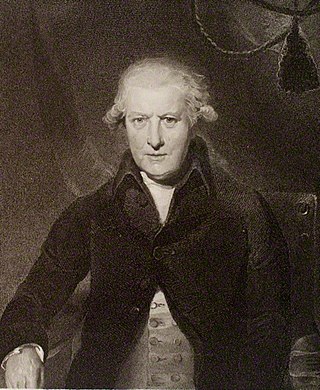Related Research Articles

A cereal is any grass cultivated for its edible grain, which is composed of an endosperm, a germ, and a bran. Cereal grain crops are grown in greater quantities and provide more food energy worldwide than any other type of crop and are therefore staple crops. They include rice, wheat, rye, oats, barley, millet, and maize. Edible grains from other plant families, such as buckwheat, quinoa, and chia, are referred to as pseudocereals.

Rye is a grass grown extensively as a grain, a cover crop and a forage crop. It is a member of the wheat tribe (Triticeae) and is closely related to both wheat and barley. Rye grain is used for flour, bread, beer, crispbread, some whiskeys, some vodkas, and animal fodder. It can also be eaten whole, either as boiled rye berries or by being rolled, similar to rolled oats.

The Corn Laws were tariffs and other trade restrictions on imported food and corn enforced in the United Kingdom between 1815 and 1846. The word corn in British English denoted all cereal grains, including wheat, oats and barley. They were designed to keep corn prices high to favour domestic producers, and represented British mercantilism. The Corn Laws blocked the import of cheap corn, initially by simply forbidding importation below a set price, and later by imposing steep import duties, making it too expensive to import it from abroad, even when food supplies were short. The House of Commons passed the corn law bill on 10 March 1815, the House of Lords on 20 March and the bill received royal assent on 23 March 1815.

The British Agricultural Revolution, or Second Agricultural Revolution, was an unprecedented increase in agricultural production in Britain arising from increases in labour and land productivity between the mid-17th and late 19th centuries. Agricultural output grew faster than the population over the hundred-year period ending in 1770, and thereafter productivity remained among the highest in the world. This increase in the food supply contributed to the rapid growth of population in England and Wales, from 5.5 million in 1700 to over 9 million by 1801, though domestic production gave way increasingly to food imports in the 19th century as the population more than tripled to over 35 million.

The Zollverein, or German Customs Union, was a coalition of German states formed to manage tariffs and economic policies within their territories. Organized by the 1833 Zollverein treaties, it formally started on 1 January 1834. However, its foundations had been in development from 1818 with the creation of a variety of custom unions among the German states. By 1866, the Zollverein included most of the German states. The Zollverein was not part of the German Confederation (1815-1866).
The Long Depression was a worldwide price and economic recession, beginning in 1873 and running either through March 1879, or 1896, depending on the metrics used. It was most severe in Europe and the United States, which had been experiencing strong economic growth fueled by the Second Industrial Revolution in the decade following the American Civil War. The episode was labeled the "Great Depression" at the time, and it held that designation until the Great Depression of the 1930s. Though it marked a period of general deflation and a general contraction, it did not have the severe economic retrogression of the Great Depression.

Rye bread is a type of bread made with various proportions of flour from rye grain. It can be light or dark in color, depending on the type of flour used and the addition of coloring agents, and is typically denser than bread made from wheat flour. Compared to white bread, it is higher in fiber, darker in color, and stronger in flavor. The world's largest exporter of rye bread is Poland.

A commercial treaty is a formal agreement between states for the purpose of establishing mutual rights and regulating conditions of trade. It is a bilateral act whereby definite arrangements are entered into by each contracting party towards the other—not mere concessions.
The great depression of British agriculture occurred during the late nineteenth century and is usually dated from 1873 to 1896. Contemporaneous with the global Long Depression, Britain's agricultural depression was caused by the dramatic fall in grain prices that followed the opening up of the American prairies to cultivation in the 1870s and the advent of cheap transportation with the rise of steamships. British agriculture did not recover from this depression until after the Second World War. Other countries in Western Europe such as the Netherlands experienced the same agricultural crisis (1878–1895) as a result of the market being flooded by cheap grain from the United States and Canada.
The accession of the city state of Hamburg to the German Customs Union, commonly known as Zollverein, in 1888 was the culmination of a project for the economic and monetary union of Germany, stretching back to 1819. In that year Schwarzburg-Sondershausen joined Prussia’s internal customs union, the first other state to do so and the first of many to follow.
The Marriage of Iron and Rye is the name given to the coalition of interests between industry and agriculture that supported the adoption of protectionism in Imperial Germany by the Tariff of 1879.
The German tariff of 1879 was a protectionist law passed by the Reichstag that imposed tariffs on industrial and agricultural imports into Imperial Germany.

The French tariff of 1881 was a tariff passed by the National Assembly of the French Third Republic that became law on 7 May 1881.
The German tariff of 1887 was a protectionist law passed by the Reichstag that raised tariffs on agricultural imports into Imperial Germany. It became law on 21 December 1887.

The German tariff of 1902 was a protectionist law passed by the Reichstag that raised tariffs on agricultural imports into Imperial Germany. It became law on 25 December 1902.

The German tariff of 1925 was a moderately protectionist law passed by the Reichstag that reintroduced tariffs on agricultural imports into Weimar Germany. It came into force on 1 September 1925.
The French tariff of 1885 was a protectionist law passed by the National Assembly of the French Third Republic that imposed tariffs. It became law on 28 March 1885.
The French tariff of 1887 was a protectionist law passed by the National Assembly of the French Third Republic that imposed tariffs. It became law on 29 March 1885.
Hans Wilhelm Alexander Graf von Kanitz-Podangen was a German politician for German Conservative Party and Junker.

The 1766 food riots took place across England in response to rises in the prices of wheat and other cereals following a series of poor harvests. Riots were sparked by the first largescale exports of grain in August and peaked in September–October. Around 131 riots were recorded, though many were relatively non-violent. In many cases traders and farmers were forced by the rioters to sell their wares at lower rates. In some instances, violence occurred with shops and warehouses looted and mills destroyed. There were riots in many towns and villages across the country but particularly in the South West and the Midlands, which included the Nottingham cheese riot.
References
- Percy Ashley, Modern Tariff History: Germany–United States–France (New York: Howard Fertig, 1970).
- Michael Tracy, Government and Agriculture in Western Europe, 1880–1988 (London: Harvester Wheatsheaf, 1989).